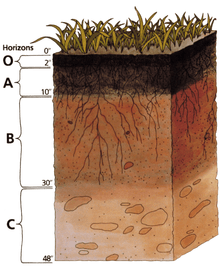Soil physics
This article is about the academic discipline. It is not to be confused with the physical properties of soils.
For a broader coverage related to this topic, see Soil science.
Soil physics is the study of soil physical properties and processes. It is applied to management and prediction under natural and managed ecosystems. Soil physics deals with the dynamics of physical soil components and their phases as solid, liquids, and gases. It draws on the principles of physics, physical chemistry, engineering, and meteorology. It is especially important in this day and age because most farmers require an understanding of agroecosystems. Soil physics applies these principles to address practical problems of agriculture, ecology, and engineering.[1]
Prominent soil physicists
- Edgar Buckingham (1867–1940)
- The theory of gas diffusion in soil and vadose zone water flow in soil.
- Lorenzo A. Richards (1904–1993)
- General transport of water in unsaturated soil, measurement of soil water potential using tensiometer.
- John R. Philip (1927–1999)
- Analytical solution to general soil water transport, Environmental Mechanics.
See also
- Agrophysics
- Bulk density
- Capacitance probe
- Frequency domain sensor
- Geotechnical engineering
- Irrigation
- Irrigation scheduling
- Neutron probe
- Soil porosity
- Soil thermal properties
- Time domain reflectometer
- Water content
Notes
- ↑ Lal, Rattan; Manoj Shukla (2004). Principles of Soil Physics. CRC Press. p. 5. ISBN 0-8247-5324-0.
- Encyclopedia of Soil Science, edts. Ward Chesworth, 2008, Uniw. of Guelph Canada, Publ. Springer, ISBN 978-1-4020-3994-2
External links
This article is issued from Wikipedia - version of the 5/6/2016. The text is available under the Creative Commons Attribution/Share Alike but additional terms may apply for the media files.
